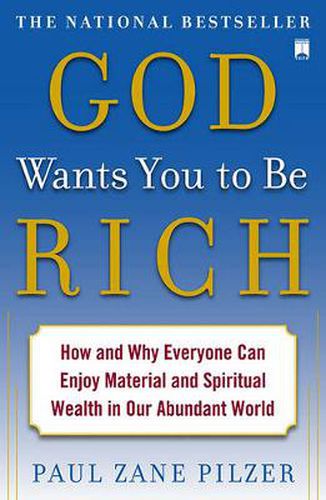Readings Newsletter
Become a Readings Member to make your shopping experience even easier.
Sign in or sign up for free!
You’re not far away from qualifying for FREE standard shipping within Australia
You’ve qualified for FREE standard shipping within Australia
The cart is loading…






In God Wants You to Be Rich, bestselling author Paul Zane Pilzer provides an original, provocative view of how to accumulate wealth and why it is beneficial to all of humankind.A theology of economics, this book explores why God wants each of us to be rich in every way–physically, emotionally, and financially–and shows the way to prosperity, well-being, and peace of mind. Pilzer explains that the foundation of our economic system is based on our Judeo-Christian heritage and includes chapters on a variety of financial issues from outsourcing and unemployment to the rise of technology and real estate. Pilzer puts an interesting spin on the debate in the Christian community about the relationship between God and wealth. Prosperity preachers encourage the idea that God wishes his followers to have wealth, but other ministers don’t want to confuse finance with faith. In God Wants to Be Rich, Pilzer presents both Biblical and economic reasons supporting the idea that God wants his followers to be prosperous in every possible way–health, peace of mind, and material possessions.
$9.00 standard shipping within Australia
FREE standard shipping within Australia for orders over $100.00
Express & International shipping calculated at checkout
In God Wants You to Be Rich, bestselling author Paul Zane Pilzer provides an original, provocative view of how to accumulate wealth and why it is beneficial to all of humankind.A theology of economics, this book explores why God wants each of us to be rich in every way–physically, emotionally, and financially–and shows the way to prosperity, well-being, and peace of mind. Pilzer explains that the foundation of our economic system is based on our Judeo-Christian heritage and includes chapters on a variety of financial issues from outsourcing and unemployment to the rise of technology and real estate. Pilzer puts an interesting spin on the debate in the Christian community about the relationship between God and wealth. Prosperity preachers encourage the idea that God wishes his followers to have wealth, but other ministers don’t want to confuse finance with faith. In God Wants to Be Rich, Pilzer presents both Biblical and economic reasons supporting the idea that God wants his followers to be prosperous in every possible way–health, peace of mind, and material possessions.